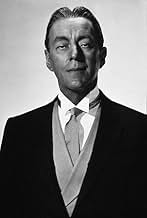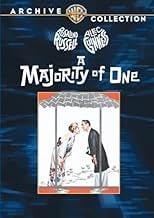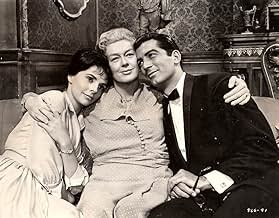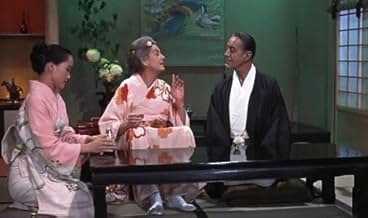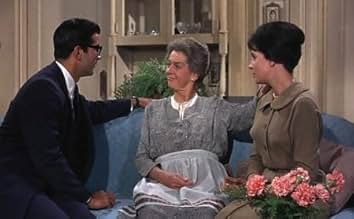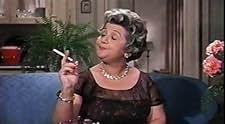CALIFICACIÓN DE IMDb
6.7/10
1.3 k
TU CALIFICACIÓN
Un viudo japonés y una viuda de Brooklyn encuentran un amor inesperado, pero primero deben superar las diferencias culturales y aprender la comprensión y la compasión.Un viudo japonés y una viuda de Brooklyn encuentran un amor inesperado, pero primero deben superar las diferencias culturales y aprender la comprensión y la compasión.Un viudo japonés y una viuda de Brooklyn encuentran un amor inesperado, pero primero deben superar las diferencias culturales y aprender la comprensión y la compasión.
- Nominado a 1 premio Óscar
- 3 premios ganados y 4 nominaciones en total
Mae Questel
- Essie Rubin
- (as Mae Questal)
Harriet E. MacGibbon
- Lily Putnam
- (as Harriet MacGibbon)
Lillian Adams
- Mrs. Stein
- (sin créditos)
Leon Alton
- Ship Passenger
- (sin créditos)
Monya Andre
- Ship Passenger
- (sin créditos)
Mary Chan
- Spectator at Disembarkation
- (sin créditos)
Spencer Chan
- Ship Passenger
- (sin créditos)
Opiniones destacadas
Looking at the film afresh as a mature adult, I'm now amazed I never realized that however excellent an actor Alec Guiness was, he simply looked ludicrous as an ersatz Japanese man. He appeared to have some sort of tightening device around his eyes so that they always looked closed! I guess that passed for generic Asian looks in those days. Too bad at the time James Shigeta was too young for the part; I kept visualizing him as an older man. That quibble aside, it is truly a heartwarming tale and well-performed by the wonderful Rosalind Russell and Mr. Guiness. Nice to see a regular-guy performance by Ran Danton, too, as the son-in-law. I'd always associated him with "Legs" Diamond and other unsavory characters he usually seemed to play. All in all, entertaining and drives home some important points about tolerance and family relations.
For the first time I have seen the film A MAJORITY OF ONE. I also have been reading some of the reviews here on IMDb. So many of them harp on the fact that Alec Guinness was cast as the Japanese businessman who falls in love with Rosalind Russell's lonely Jewish widow. For that matter, some take exception to the casting of the Catholic Miss Russell as Mrs. Jacoby.
It's called acting, people! Mr. Guinness and Miss Russell certainly convinced me that they were these people - an elderly lonely Jewish widow and an equally elderly lonely Japanese widower who meet and, although from very different cultures, find a common ground.
This was a beautifully performed and profoundly moving story. I don't know how I've managed to never see it before. It left me feeling all warm and fuzzy inside. I will certainly be adding this film to my collection.
It's called acting, people! Mr. Guinness and Miss Russell certainly convinced me that they were these people - an elderly lonely Jewish widow and an equally elderly lonely Japanese widower who meet and, although from very different cultures, find a common ground.
This was a beautifully performed and profoundly moving story. I don't know how I've managed to never see it before. It left me feeling all warm and fuzzy inside. I will certainly be adding this film to my collection.
Of course the producers needed some names to carry this, and after all, Guinness could play anything, right? Here we have Sir Alec in a variation on his standard Refined Exotic Man, very similar to his Prince Faisal in Lawrence of Arabia and Brahmin Professor Godbole from A Passage to India. On Broadway Mr. Asano was played by Cedric Hardwicke, so this was simply continuing established --and highly outdated-- practice.
At least the onstage Mrs. Jacoby was portrayed by Gertrude Berg, creator and star of TV's The Goldbergs (1949-1957), and the kind of little round Jewish mama one would visualize in the role. Roz does her best, but it's not just that she's doing Jew-Face to Guinness' Yellowface-- she comes across as gawky and vulgar rather than sweet and endearingly quaint.
As has been presented in innumerable interracial romances intended for white audiences, the potential shock is taken out by the knowledge that hey, after all, those actors are both white. Acting is pretending! Nowadays, however, audiences are more sophisticated and like a bit more realism.
Now, who would we cast in a new production of A Majority of One?
At least the onstage Mrs. Jacoby was portrayed by Gertrude Berg, creator and star of TV's The Goldbergs (1949-1957), and the kind of little round Jewish mama one would visualize in the role. Roz does her best, but it's not just that she's doing Jew-Face to Guinness' Yellowface-- she comes across as gawky and vulgar rather than sweet and endearingly quaint.
As has been presented in innumerable interracial romances intended for white audiences, the potential shock is taken out by the knowledge that hey, after all, those actors are both white. Acting is pretending! Nowadays, however, audiences are more sophisticated and like a bit more realism.
Now, who would we cast in a new production of A Majority of One?
10dlcnut-1
One of the great love stories of all time. If it is possible to fall in love with a movie I fell the first time I saw it. I did not have recorder at the time. I thought it might be a time filler when I saw the listing. I like Rosalind Russell and Alec Guinness so I tuned it in. I wish I had a recorder at that time.
It is wonderful movie. It starts with two elderly bigoted, hurt and angry people who go through trials and tribulations with her family and still get together in the end. They are hurt because of family losses during World War II.
It is a quiet romantic comedy that comes off beautifully.
If you like love stories, then this movie is a must.
It is wonderful movie. It starts with two elderly bigoted, hurt and angry people who go through trials and tribulations with her family and still get together in the end. They are hurt because of family losses during World War II.
It is a quiet romantic comedy that comes off beautifully.
If you like love stories, then this movie is a must.
This is a gentle little film that may have it's faults with the hindsight of 40 years, but is enjoyable, especially I feel to those that remember the post WW11 days.
Alec Guinness plays the part beautifully, with his usual master of the character, Rosalind Russel plays a good stereotyped Jewish Mother .... the other characters just fill in between the lines. The only character that I find fault with is 'Eddy' the No. 1 boy of the family in Tokyo. He is obnoxious and completely out of character with a real 'House Boy' of the times that was lucky enough to get a 'cushy number' working for an American Diplomat.
In these days of virtual reality with sex, blood and car chases being the three main criteria of movie making, this movie is like going to a stage production from the 50's...... gentle and enjoyable.
Alec Guinness plays the part beautifully, with his usual master of the character, Rosalind Russel plays a good stereotyped Jewish Mother .... the other characters just fill in between the lines. The only character that I find fault with is 'Eddy' the No. 1 boy of the family in Tokyo. He is obnoxious and completely out of character with a real 'House Boy' of the times that was lucky enough to get a 'cushy number' working for an American Diplomat.
In these days of virtual reality with sex, blood and car chases being the three main criteria of movie making, this movie is like going to a stage production from the 50's...... gentle and enjoyable.
¿Sabías que…?
- TriviaWhen Eddie is repairing Mrs. Jacoby's TV, rather than actually shooting the scene with material already selected and pre-recorded to be seen on the TV's screen, the filmmakers used another, less expensive trick; since TV scan rates are not the same as film, whenever a TV is seen (and it's showing something being broadcast), the dark scan lines are visible (and sometimes the TV's picture will "roll"). As this was still early in the TV-era, showing TVs broadcasting was something of a novelty, but it came with the aforementioned problems. To combat this, a "TV" was built (or, more accurately, something which looked like a TV). What's being shown on the "screen"' is actually film, which is being projected from behind the scene, and with the aid of a mirror, and a semi-translucent material to give the illusion of a screen, the result is that a high-quality image is seen, and there's no problem synching camera with TV.
- ErroresThe steering wheel of the taxi cab is on the wrong side.
- ConexionesReferenced in The Human Jungle: Struggle for a Mind (1964)
- Bandas sonorasWhere Am I? (Am I in Heaven?)
(uncredited)
Music by Harry Warren
Played when Mrs. Jacoby and Mr. Asano discuss the dateline and Russia on board the ship
Selecciones populares
Inicia sesión para calificar y agrega a la lista de videos para obtener recomendaciones personalizadas
Detalles
- Tiempo de ejecución2 horas 36 minutos
- Relación de aspecto
- 1.85 : 1
Contribuir a esta página
Sugiere una edición o agrega el contenido que falta

Principales brechas de datos
By what name was Mañana viviré (1961) officially released in India in English?
Responda

